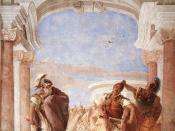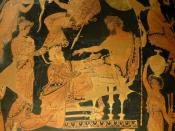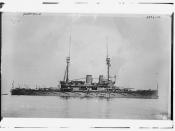Agamemnon was blessed to have such an enormous army, and this is quite possibly the only reason why he was such a powerful leader. If, however, Agamemnon had a smaller army, would he have still been such a strong leader? No, and the reasons are very extensive because not only was he very negative, but he also boasted in his power. Agamemnon was described by Homer as a powerful leader, but he neglected to show us many reasons why he was so strong. The reason why Homer did not show us many of those examples is because the only reason he was strong was because his army was very enormous in size. Throughout history, a great leader has been known to have certain aspects or qualities such as: honesty, encouragement, fairness, wisdom, and even brute strength. Agamemnon does not possess any of these qualities. The story of the Iliad describes a few great leaders and some merely sufficient leaders.
Agamemnon is simply a "sufficient leader".
Agamemnon shows his gentler side on page 107 lines 136-137. He states, "What I really want is to keep my people safe, not see them dying." Soon after we read that, we realize that he is completely lying. He really cares nothing for his people because in the next line his dialogue becomes very self-centered. He tells how his "prize" was snatched away and that he wants the Argives to fetch him another prize. This is obviously not a good leader. With his strong army, Agamemnon is a pretty good warrior. He is given the respective title as a good leader, but he comes up lacking the qualities that would make him a great leader.
Agamemnon is not very wise either. One of the main conflicts in the Iliad was between Agamemnon and Achilles. Agamemnon surely realized that Achilles would be insulted when Briseis was taken away from him. But without thinking of what Achilles could do, he ordered him to hand over Briseis. Because of his fighting skill, Achilles could have easily handled Agamemnon in a battle; therefore, death may have been eminent. Other things may have also happened but Achilles simply chose to withdraw from the war. This act was very harmful to Agamemnon because the loss of Achilles meant the loss of a great warrior. This created a huge trench for the Argives to have to crawl out of. Obviously, the decision to insult Achilles in this manner was not carefully thought through. Agamemnon should have thought twice about stealing Briseis away from Achilles.
Other evidence of Agamemnon's lack of wisdom is in the first book. Chryses, Chryseis' father, is a priest of the god Apollo. Even though Agamemnon knew this, he paid no attention to Chryses' plea for Agamemnon to return the girls. Even with the addition of a ransom, Agamemnon refused to give him his girls back. This was an extremely bad idea because Chryses had direct access to Apollo. Therefore, Apollo instantly set a plague on the Danaans when Chryses asked him to do so. If Agamemnon had the wisdom of a good leader he would have simply followed the "rules of war" and offered the girls back for the ransom. By following these rules, the entire war may have been avoided, or at least delayed for a number of years.
Agamemnon was not the best fighter. For instance, Achilles is obviously better when he bluntly tells Agamemnon that he will kill him if he takes Briseis. If Agamemnon were a better fighter, he would have embraced the challenge to fight Achilles. The Iliad however tells us that Achilles would have easily won had he not prayed to his mother Thetis, the sea-nymph. (p. 113 410-422) A person who is loyal to his family is someone that should be respected. On p. 106 Agamemnon declares that he would rather have Chryseis than his own wife. Agamemnon has placed his trust in Clytemnestra, and yet he says that he favors Chryseis over her. A great leader should not renege on a commitment to anybody, let alone his wife. This instance shows an example of why Agamemnon cannot be trusted.
The great Achilles would never have run from battle due to being frightened. However, on page 132 lines 30-32, Agamemnon is simply a coward. He had thwarted his men into Troy and ordered the Argives to flee when he believed he did not have a chance. "Obey me, all you Argives. Cut and run! Sail home to the fatherland we love! We'll never take the broad streets of Troy." At this same moment in time, he is also showing another characteristic of a bad leader. Agamemnon is being very discouraging right now, and whatever chance his men did have is now fading. Any leader that so-called "spears his own troops in the back" should be demoted and definitely seen as less than a hero or great leader.
To be a great leader, one must have certain qualities that make him or her stand out above everybody else. Perhaps some qualities are more important than others, but all qualities must be accounted for. A wise leader with a decent army will always defeat a great army with a leader who is un-wise. Major improvements on Agamemnon's part would have afforded him a place among the "great leaders," but he will always lack the qualities that raise him to this level of greatness.


